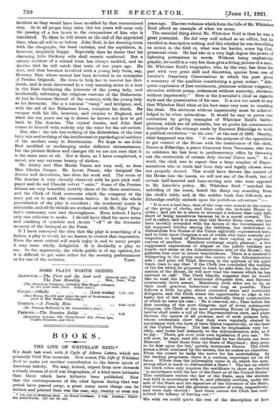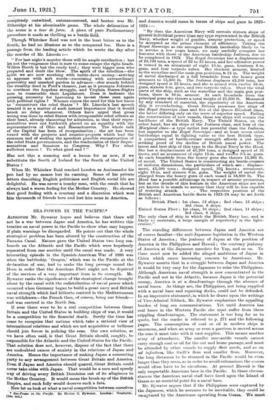BOOKS.
THE LIFE OF WHITELAW REID.*
WE dealt last week with A Cycle of Adams Letters, which are primarily Civil War memoirs. Now comes The Life of Whitelaw Reid to make yet another contribution to the heroio epoch of American history. We may, indeed, expect from now onwards a steady stream of civil war biographies, of .a kind more intimate than those which have hitherto been published. Now that the contemporaries of the chief figures during that war period have passed away, a great many more things can be written and printed than was the case, say, twenty or even ten • The Life of Whtfeissw Reid. By Royal Cortimos. 2 yob. London : Thorn- ton Butterworth. If2 123. od• net.
years ago. The two volumes which form the Life of Mr. Whitelaw Reid afford an example of what we mean.
The essential thing about Mr. Whitelaw Reid is that he was a great journalist. He did very well indeed as an editor, but he excelled in descriptive writing, and this whether he was describing an action in the field or, what was far harder, some big Con- gressional crisis. He had also in a very high degree the power of lightning portraiture in words. Without being explosively graphic, he could in a very few lines give a living picture of a man. Mr. Whitelaw Reid's biographer, who, by the way, has done his part with very great skill and discretion, quotes from one of Landor's Imaginary Conversations in which the poet gives a summary of the qualities constituting a great writer: "Ade- quate expression of just sentiments, plainness without vulgarity, elevation without pomp, sedateness without austerity, alertness without impetuosity." Here is the journalist's ideal as regards style and the presentation of his case. It is not too much to say that Whitelaw Reid when at his best came very near to reaching the ideal. His alertness without impetuosity must be acknow- ledged to be often miraculous. It would be easy to prove our contention by giving examples of Whitelaw Reid's battle- pictures, which are all admirable, but we prefer his consummate description of the attempt made by Emerson Etheridge to work a political revolution " on his own " at the end of 1863. Shortly, what happened was this. " It was the purpose of the opposition to get control of the House with the connivance of the clerk, Emerson Etheridge, a peace Democrat from Tennessee, who was to celebrate his last hour in parliamentary office by throwing out the credentials of certain duly elected Union men." In a word, the clerk was to report that a large number of Repre- sentatives who in truth had been duly and legally chosen were not properly elected. This would have thrown the control of the House into the hands, we will not say of the South, but of certain half-hearted and time-serving men who were opposed to Mr. Lincoln's policy. Mr. Whitelaw Reid " watched the unfolding of the scene, heard the sharp rap sounding from the clerk's table, and, in the sudden hush that followed, saw Etheridge craftily embark upon his perfidious adventure " :— " It is not a bad face, that of the man who stands in the centre of the group of clerks, and thus calls the inchoate House to order ; and yet he is about to attempt a scheme that only falls short of being monstrous because he is a moral coward. The roll is called, and it is seen that this Border State man, who has been lavishly rewarded with the favors of the Government for his supposed fidelity among the faithless, has undertaken to disfranchise five States of the Union rightfully represented here, and to foist upon Congress a set of rebels who have scarcely yet forgotten to speak of Richmond as their capital, as represen- tatives of another. Members exchange angry glances ; a few suppressed expressions of disgust at the paltry trickery are heard—not alone on the Administration side of the House ; the galleries lean over in intent watchfulness. There is a moment's whispering in the group near the centre of the Administration side ; and grim old Thad. Stevens, in the quietest of his quiet ways, rises to say that ` if the Clergy has concluded the reading of the list which he proposed to read, he asks that, for the infor- mation of the House, he will now read the names which he has omitted to call.' The Clerk blandly suggests that he would like to read the list of territorial delegates first, and Stevens courteously bows assent. Manifestly both sides are to be on their most gracious behaviour—as long as possible. Then follows a little by-play about contested seats and territorial delegates, and the Clerk seizes the opportunity to edge in the hasty law of last session, on a technically literal construction of which he rests his case : Be it enacted, etc., That before the first meeting of the next Congress, and of every subsequent Congress, the Clerk of the next preceding House of Represen- tatives shall make a roll of the Representatives elect, and place thereon the names of all persons, and of such persons only, whose credentials show that they were regularly elected accordance with the laws of their States respectively, or the laws of the United States.' The last lines he emphasizes very for- oibly, and looks half defiantly to the Administration side, as if to say : There, get over your own legislation if you can.' He will now, he says, read the credentials he has thrown out from Missouri. ' Read those from the State of Maryland ; they seem to be first upon the list,' quietly interposes Dawes. The Clerk seems a little confused by the tactics, but he makes no objection. From the outset he lacks the nerve for his undertaking. As the reading progresses, there is a curious, expectant air on all faces. Where does the informality come in on which the mon- strous effort is made to disfranchise a State ? The law on which the Clerk relies only requires the certificate to show an election ' in accordance with the law of the State or of the United States.' This certificate recites the law of the State, says the election was held in accordance with it, and officially certifies, under the sale of the State and the signature of the Governor of the State,that certain men had the greatest number of votes, respectively, and were duly elected 1 And these names the Clerk has com- mitted the infamy of leaving out ! "
We wish we could quote the rest of the description of how
completely outwitted, outmanoeuvred, and beaten was Mr. Etheridge at his abominable game. The whole delineation of the scene is a tour de force. A piece of pm* Parliamentary procedure is made as thrilling as a battle-field.
Though Whitelaw Reid was not in the least bitter as to the
South, he had no illusions as to the conquered foe. Here is a passage from the leading article which he wrote the day after
the murder of Mr. Lincoln :—
" For last night's murder there will be ample retribution ; but let not the vengeance that is sure to oome escape the right heads. Wilkes Booth is but the ready tool ; they were bigger men who prepared and dealt the blow. The spirit of the rebellion—the spirit we are now soothing with turtle-dove cooing---striving to appease with soft words—exorcising with extraordinary generosity and unasked pardon in advance—that stands behind the stealthy deed in Ford's theatre, just as it prompts Johnston to continue the hopeless struggle, and Virginia States-Rights men to reassemble their Legislature. Does it indicate the pressing necessity for hastening to invest these men again with political rights ? Whence comes the need for this hot haste to ' reconstruct the rebel States ' ? Mr. Lincoln's last speech treated it as a matter of such instant importance that it would brook no delay whatever. Others have urged that gross wrong was done to rebel States with irresponsible rebel officers at their head, already clamoring for admission, in that their repre- sentatives were not forthwith placed on an equality with the representatives of Ohio and Massachusetts. The whole talk of the Capital has been of reorganization ; the air has been vexed with the projects and counter-projects which had the common end of seeking the speediest possible reconstruction of the rebel State governments, and the readmission of their Repre- sentatives and Senators to Congress. Why ? For what sufficient reason ? To what good end ?
Has not this a meaning and a lesson for us now, if we substitute the South of Ireland for the South of the United
States ?
When Mr. Whitelaw Reid reached London as Ambassador his otters describingby no means lost its cunning. Some of his private
L
describing English politicians and English sooial life are delightful. He was never a touchy man, with the result that he always had a warm feeling for the Mother Country. He showed that good feeling with a courtesy and a discretion which won him thousands of friends here and lost him none in America,



































 Previous page
Previous page